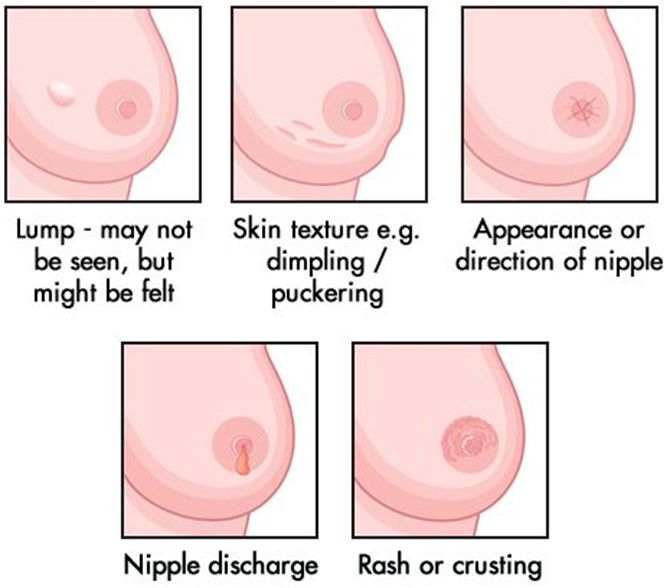 | « Back to article | Print this article |
The breasts become heavy, tender and the pain fully disappears after the periods start.
Beware of lumps, bloody discharge and puckered skin, says renowned oncologist Dr P Jagannath.

To ensure good health, women need to take some precautions.
Some years ago, Rachel, one of the secretaries in the hospital I worked at, came crying to me that both her breasts had become extremely painful particularly before her menstrual periods.
She was worried that she had cancer, because one of her relatives was recently diagnosed for it.
I told her that pain in the breasts is quite common for women and is due to hormonal changes along with menstrual cycle.
The breasts become heavy, tender and the pain fully disappears after the periods start. This is not to be worried about as a sign of malignancy.
Let me help you understand the different types of cancer better.
A. Breast Cancer
Here are some ways you can detect cancer early.
Breast Lump
Classically, a painless lump in breast like a buried pea or sometimes larger like a grape, is one of the important signs of breast cancer. It can be irregular.
Unfortunately, it's painless and hence neglected. It is much easier to find such lumps by a good Breast Self Examination (BSE).
Mammography has been overrated and the frequency of mammography and the age to recommended are changing world over.
For India, and for many developing countries, self-examination continues to be the best option.
A careful examination with the pulp of fingers, immediately after the fifth day of periods, is the best way to locate anything abnormal. It costs nothing and is the easiest way to detect cancer!
Lumpy breast versus Lump in the breast
Many times, the breast feels lumpy all over and sometimes tender too. This is particularly true of what is called fibrocystic disease which is hormonally dependent.
Such lumpy breasts are not a cause of great concern. But if there is anything which is really hard, say the consistency of an olive, then certainly it has to be carefully looked into.
Some of the breast lumps are clearly benign; particularly those occurring in girls less than 20 years of age and which keep moving around in the breast.
They are called fibroadenomas and they are not to be worried about. Only if they increase in size, there is cause for concern.
Skin puckering
Other tell-tale signs of breast cancer is when the skin starts getting puckered (adherent) onto the lump which is underneath.
Sometimes, when you lift the arms, along with the lump, a little tag of skin gets pulled up. These are definitely warning signs and need to be examined by a doctor.
Breast pain
Breast pain is a distressing symptom. This is not to be worried about as a sign of malignancy.
Unfortunately there is no effective treatment for this mastodynia due to fibrocystic disease, except intaking a Paracetamol frequently. Some people take Vitamin E but mostly these are emperical medication.
As the hormonal activity starts reducing, the breast pain also starts decreasing. Pain is not an early sign of cancer.
Nipple discharge
Nipple discharge is also quite common.
If there is a bloody discharge in the nipple, that is something to be worried about. But bloody discharge from the nipple can also occur in younger women and if it is bright red it can also be due to what is called 'duct papilloma' which again needs surgical intervention.
Nipple discharge, bloody discharge, particularly, is also a sign of breast cancer.
On the other hand greenish discharge or straw coloured discharge are common in a fibrocystic disease which is completely benign.
So one of the ways of checking out is examining or doing a slide test on the discharge and you can differentiate between a serious problem or a benign disease.
Retraction of a nipple
This is another sign which has to be carefully looked in a mirror.
A lady can easily recognise that an aerola which should be more or less equal on both sides starts becoming smaller and the nipple starts getting buried inside with any ulceration on the top is again an important sign of breast cancer and has to be immediately taken note of.
Well, these are the common presentations of breast cancer.
We do hope that none would wait till it becomes advanced with infiltration of the skin and with an orange peel appearance and ulceration which is now rarely seen, thanks to awareness of many of the women.
So most of the breast cancers can be detected early and once detected early, a lot of them have a potential for cure and also there is a significant change in the treatment parameters.
Now we can conserve the breast and not remove the breast by limiting the removal of the tumour and the adjacent breast and lymph node in the armpits rather than sacrificing the whole breast. This has made a big difference as far as the feminine personality is concerned.

B. Cervical and Uterine Cancer
Cervix is the mouth of the uterus which projects into the vagina.
Uterus is an organ in the pelvis with a cavity which constantly undergoes proliferation and involution as per the menstrual cycles.
Bleeding and discharge
Bleeding which I am talking about is not the menstrual blood loss which is physiological for all women.
The bleeding which is serious is the inter menstrual or in between the menstrual period or the post-coital bleeding. These are important indicators which definitely need examination of the cervix by a gynaecologist.
There is also sometimes foul smelling discharge. Discharge from the vagina particularly without any itching or any irritation is again a reason for getting examined.
Cervical cancer is on the decline thanks to good cervical hygiene, childbirth at older age group and overall number of children being 1 or 2 in the modern times.
We hopefully will see less and less of cervical cancer.
An annual check up by just an examination of the cervix would be a great way to pick up an early cervical cancer and even cervical infections.
Uterine Cancer
Menopause occurs in women around the age of 50. After a couple of years when the cycle has stopped and suddenly there is spotting of blood, it is an important warning sign and should be immediately taken note of.
Unexplained backache is sometimes another way of presentation of endometrial carcinoma. This again, once detected in early stage, can have high potential for cure.
Ovarian Cancer is perhaps the most difficult of cancers to detect early because there are hardly any symptoms.
Unexplained backache, fullness of the abdomen combined with weight loss and pelvic pain, particularly in the 50 to 70 years age group are all signs of ovarian cancer.
It can occur in younger women in their 40s too. The symptoms are all non-specific and many times, ovarian cancer is diagnosed in stage III.
An ultrasound has an ability to pick up ovarian cancer. If you are going for any health examination, definitely get an ultrasound of abdomen and pelvis and it is likely that you can pick up ovarian cancer at an early stage.
Yes, there are some blood tests, some marker tests for ovarian cancer but it is not practical and feasible to do all these marker tests on a yearly basis unless one has a family history or one is very concerned of the same.
A tumour marker test like Ca 125 would be useful but not always definitive.
After you have read this, you are certainly better informed about cancer. I urge you to guide others by disseminating this information so that more women can take better care of their health.
The author Dr P Jagannath is chairman, department of Surgical Oncology, Lilavati Hospital and Research Centre, Mumbai.